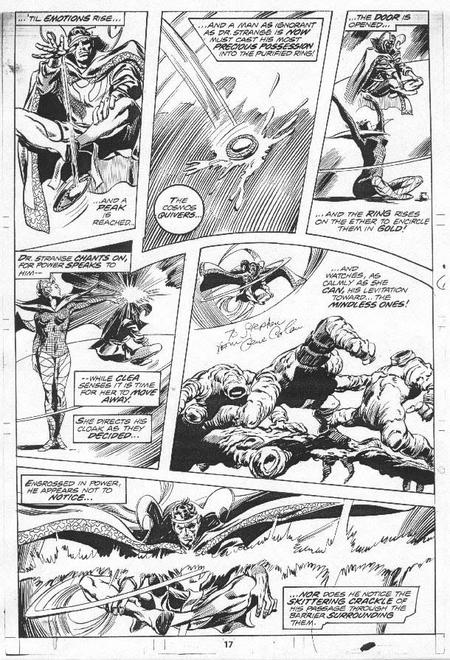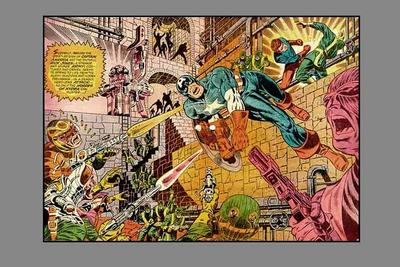March 31, 2004
THEY ARE MODELS AND THEY ARE LOOKING GOOD

The new Basement Jaxx further enhances what is becoming really quite a promising year for singles.
I think that the Jaxx are masters of the anempathic riff: the riff that comes out of nowhere, remorselessly indifferent to the track it dominates.
The video is also brilliant. It's made by Traktor, the same folk who produced the outstanding 'Where's Your Head At' clip, and it comes off as a cyberotic update of Westworld.
Question: just why are women simulating robots simulating women soooooooo sexy?
March 30, 2004
JUST VERDICTS
Popjustice makes my week by delivering appropriately judicious verdicts on both BEYONCE and ALICIA 'SURREY' KEYS. On B: she "really needs people around her who can say, 'You are, frankly, mediocre, and you're not going to fluke another 'Crazy In Love', so get The Child back together pronto." LOL!
And as for Alicia Keys, nice to see someone breaking the oppressively tasteful consensus and admitting that's she's dull, worthy, coffeetable, retro, no better than Jamie Cullum or Katie Mellua really. To be honest witchya, I'd prefer to listen to Cullum or Mellua, at least they've got tunes.
IF YOU FANCY
... a piece of Quatermass memorabilia , it'll only set you back $400 (or a mere $1500 ready-assembled).
Top three most irritating things in pop at the moment
1) The Scissor Sisters singer. Wouldn't you like to thump him in his smug, preening, PoMo mug? Again. And again.
And again.
2) Atomic Kitten. Soft target maybe, and they're splitting, so perhaps it's pointless, but ... Not sure what's worse, their 'we're-mad-us' hedonic partygirl mode or their coy, sidelong downward glances to camera (connoting that they are, y'know sensitive and demure) pose. Well: you don't have to choose, because their farewell single is a double A side, with one video for each mode/ mood. Ker-ist.
3) Janet Jackson's 'smile'. As artificial and sickeningly sweet as a can of vanilla coke. As chillingly insincere as a politician's handshake. As warm and inviting as a Stepford wife's embrace. It seems like Janet's been smiling nonstop for the last twenty years, her dental dazzle a wearyingly permanent fixture on the pop landsape. Well, at least it distracts you from the music. Except her forget-them-even-as-you-hear-them self-erasing texts do that themselves. k-punk no-prize to the first person who can name five JJ singles (not including anything off Jam and Lewis's brilliant Control)....
LAY! LAY! LAY!

WARNING: LONG POST ON 70s TV FOLLOWS
(COULD BE REGARDED AS NOSTALGIC)
People were spoiled in the 70s.
Angus' misgivings about British TV now are more than justified - I don't hear anyone crowing that (ha!) we have the best television in the world any more - but - and I brace myself for another barrage of accusations of being nostalgic - in the seventies, well, maybe there was something to write home about. (And yes, of course, at the bottom end, there was all manner of unspeakable dross. Of course, of course. But at the top end?)
For whatever reason, contemporary reaction to Kneale's final Quatermass serial was less than enthusiastic. Kneale hadn't written a Quatermass story since 1958, when Quatermass and the Pit was broadcast. (His disgust with Hammer's casting of barking Irish-born American drunk Brian Donlevy as the eponymous hero meant that it took the best part of a decade before Kneale would allow the studio to adapt that serial into a film. As it happened, the result turned out to be the finest of the Hammer versions.)
Imagine that: everything had happened in those two decades. 1958 was a world away from 1979: a whole history of pop music, for instance had been time-lapse condensed into the amphetamine acceleration of the intervening years. Quatermass, always an ambivalent figure in relation to modernism and to Progress - like Freud, he was their embodiment, and in being their embodiment also their greatest critic; it's easy to see how Quatermass could have seemed dustily, fustily outmoded, a fading monochrome relic, in brave new 1979. Postmodern temporality had not yet taken hold. We didn't know, then, that everything would come back, eventually.
Kneale had been written the serial in the early 70s but the BBC's faintheartedness about cost meant that it was eventually taken up by Thames TV's film-making unit, Euston films. Instead of a budget of £250,000 for the whole series, the production was now able to command £300, 000 for each of its four episodes.
Kneale apparently saw the serial as a requiem for the Sixties: a dark parable about the thanatropic drives which youth messianism could nurture. In place of the hippie dream of a renewed Earth, his trance-intoxicated postpunk protocrusties - the Planet People - long for an escape into another world, another solar system. Quatermass' landscape was projected directly out of seventies' anxieties. The choking ecosphere, the fuel shortages, the power-cuts, the disintegration of the social contract into a Hobbesian war of all-against-all, it was Sixties' utopianism in ruins. Those barricaded streets, the roving armed streetgangs (inspired by Baader Meinhoff and the Red and Angry Brigades) could equally well have walked off a Killing Joke record cover or from a Conservative party election broadcast. Such was the way in which imaginaries and impulses - reactionary, neo-archaic, radical - became collapsed into one another (collapsed like the abandoned vehicles from which the geriatric colony in the serial construct their bolthole rhizome) in 1979.
1979, I hardly need to remind you, was the year of Mrs Thatcher's election.
And of Gary Numan's Replicas and Joy Division's Unknown Pleasures.
If you want to think sf analogues for the 79 Quatermass, look to these artifacts rather than to the epic progfests (Star Wars and Close Encounters) to which it was inevitably, and unfavourably, compared at the time. Star Wars isn't even sf, it’s epic Fantasy; whereas Close Encounters, in those early, obsessive scenes, is almost Knealeian, actually - but all of that is dry-ice dissipated in the Jarre-like liteshow and cutesy big not bug-eyed 'aliens’ of the denouement. The legacy of these big two was catastrophic, perhaps fatal, for bigscreen sf. It’s not only the retreat from the social into Fantasy zones, or the reduction of ethical complexity into simple-minded Manicheanism, it’s the compulsory Spectacle of the conspicuously expensive FX .
What Close Encounters has in common with Quatermass is its vision of human populations, entranced into unconscious complicity with the alien powers. But Quatermass is consummately able to resist the temptation to which Spielberg must succumb; that of anthropomorphizing the aliens (cf AI). The purposes of the aliens in Quatermass remain sublimely, unfathomably opaque, like their physical forms. Anything we ‘learn’ about them is conjecture, inference, speculation. They are light years away from us. In every sense.
Kneale’s great themes – the intimacy of the alien; the lust for annihilation in organic beings –this time emerge in an analysis of Youth millenarianism. His rendition of youth culture is, predictably, more Nuttall-Bomb Culture, more Civlization and its Discontents, than it is Age-of-Aquarius utopian. The urge to herd together into crowds, the, is interpreted symptomatically as the following of a programme seeded deep into the unconscious of the young.
(Here is the convergence with Joy Division. The breathtaking audacity of Unknown Pleasures, after all, lay in its presumption that youth culture was essentially thanatoid. Maybe only the Stones had made that equation so starkly, but they had only hinted at it, returning to more familiar hedonic territority. Joy Division were unremitting: a black hole effect, an inversion and terrible turning against itself of rock’s exhilaration and energy.)
Kneale’s usual cybergothic methodology – disinterring Now in the relics of the Deep Past – focuses on Neolithic stone circles. Quatermass hypothesizes that the megalithic sites are trauma records, the stones arranged as commemorations of mass exterminations. The Earth’s scar tissue. (The parallel between astropocalyptic events and stone circles had actually been made three years earlier, in ITV’s memorably creepy children’s programme from1976, Children of the Stones.) The stone circles were the sites of what Quatermass ominously refers to as previous ‘harvestings’ of the human race. Who can guess what the species reaping humanity is like and what their motivations are? A protein lust? Quatermass can only guess.
Refused permission to film at Stonehenge by the British Tourist Board, Kneale switched a key scene to Wembley stadium, which becomes a modern mausoleum. (An unwitting prophecy of the cultural death of 80s stadium rock?)
Kneale was disappointed with the casting of John Mills, which was forced on him by Euston who insisted on a big-name star. Kneale preferred Andre Morell and Andrew Keir (who played the scientist in, respectively, the TV and the film versions of Quatermass and the Pit). He supposedly found Mills insufficiently heroic, scarcely recognizable as the same figure Morell and Keir had portrayed. Yet Mills’ quiet anger, his compassion and disgust for humanity, his slighted but enduring dignity, make him what could be the definitive Quatermass.
Mills brings a terrible authority to the cosmic Spinozism of the show’s ethical pay-off. When the young astronomer Joe Kapp – just thawing from the shock of losing his entire family – talks of ‘evil’, Quatermass corrects him: ‘Maybe evil is always someone else’s good. Perhaps it’s a cosmic law.’
Intertextual link: The Fall stole the Planet People's chant ('Lay! Lay! Lay!') on their 'Lay of the Land' (off The Wonderful and Frightening World of...).
March 29, 2004
WOULD YOU WANT A PASSIONATE PLUMBER?
It can't only be me who's been incensed by the noxious cant and self-serving hypocrisy issuing from Wapping in respect of Sven Goran Eriksson over the last few days. (Actually, it isn't: at least one columnist in The Times today raised an eyebrow.) No wonder the Swede was exasperated and bemused by his recent monstering. All he had done, after all, was speak to a prospective employer who was prepared to make him a very good affair. An exceptional offer, actually. Eriksson stood to become the best-paid coach in the world with an almost unlimited budget. Come July, when those same journalists (mostly redtop, but not exclusively so, I'm sad to say) may well be chief torch-carriers in yet another witch-hunt, this time calling for Eriksson's removal from the post, his turning down the Chelsea job may be a decision SGE comes to rue. There was no question of Eriksson walking out on England before or during the European championship finals. His 'crime' consisted in sounding things out, listening to an offer, considering his future after Euro 2004. Of course, no journalist - a profession renowned for its high-mindedness and ethical probity - would even consider a better offer from a rival newspaper. Heaven forbid.
Needless to say, 'the motive' for this latest slew of invective was the usual unseemly pottage of journalistic opportunism, English auto-laceration (for what would driving Sven out be if not an act of collective self-destruction?), myopia and --- xenophobia. It is the journalists, not Sven, who are fellow travellers and freeloaders; it is they who exploit the passion for the national team, who exhibit a fickleness that goes far beyond mere lack of loyalty. The criticisms of Eriksson - for his alleged coolness and deficit of passion - trade on a less than subtle national stereotype, but what they reveal is that it isn't SGE's lack of professionalism that's the 'problem'; it's his excess of it. Eriksson's sin is to view the England job as just that: a job. Not a divine mission, not a lifelong vocation. But a job. As Sphaleotas remaked to me: would you want a passionate plumber? But oh yeah, we had a passionate plumber. Anyone care to remember Kevin Keegan? The implication of course is that only a foreigner would view the post in so detached and pragmatic a way. The idea that detachment, pragmatism and self-interest could actually be virtues in an England coach - this hasn't occured to any of the hacks. (But, naturally, I'm giving them too much credit by assuming there's any reasoning in their positions). Ask yourself this: would we want an England manager who regarded holding the position as being detrimental to his self-interest?
The embarrassing paucity of credible alternative candidates is the most compelling argument for going cap in hand to Sven. Alan Curbishley? Steve Mclaren? You're having a laugh. Surely we've learned the lesson by now that employing an international coach who has not won a trophy of any serious status, let alone a league championship, is, to say the least, a mistake. To this minimal requirement, I would add: some experience of managing top-quality players and of the Champions League and, preferably, some experience of managing abroad. Successful experience, I hardly need add.
btw It's actually the rare England manager who has won a league championship. (I think the last one was Terry Venables, who won La Liga with Barcelona back in 1985. And before that?) Sven's c.v. prior to taking on the England job was, by some considerable distance, the most impressive of any incumbent. Bobby Robson's most successful work was done after he managed England. And as for Hoddle, Keegan? Also-rans, never-should have beens.
I don't mean to disparage Curbishley or Mclaren. Far from it. But they're clearly not ready for the job and in any sane world, they wouldn't even be considered for it.
We should count ourselves lucky that we've still got Sven.
March 28, 2004
COMING VERY SOON....
Posts on the final Quatermass serial and Dennis Potter....
But for now, just have to share with you a coincidence. Last week, we were discussing Romero's Season of the Witch (which as one correspondent pointed out is broadcast tomorrow, on C4, albeit at the ungodly hour of 1 A.M.) During the course of this discussion, another correspondent mentioned Halloween III: Season of the Witch. Who should have been the original scriptwriter for this film? None other than Nigel Kneale. It turns out that Carpenter, perhaps not surprisingly, was something of a Kneale devotee; he used the name 'Martin Quatermass' as an alias for his scriptwriting of Prince of Darkness and made references to Quatermass and the Pit in In the Mouth of Madness.
March 26, 2004
WHY MAGAZINES MATTER
Nah, Luke's wrong. Or at least, it wasn't ever thus. NME in the late seventies and early to mid eighties (Penman, Morley, Burchill, Kopf, Sinker), Melody Maker in the mid-to-late eighties and early nineties (Simon, Stubbs, Paul Oldfield, the Stud Bros, Taylor P), the Wire with Mark S at the helm, even those few pages of i-D over which Kodwo and Steve Beard presided for the best part of the 90s: all these magazines/ papers were urgent, indispensable, inspirational for a time. No doubt there are hard social, demographic and economic reasons why they ultimately went into decline or died out altogether, no doubt miserabilists and impossibilists (aka 'realists') will argue that the conditions for those flashes of pop-publishing brilliance were anomalous and couldn't be recreated today. No doubt...
But I'm not persuaded. The tragedy of the likes of Penman and TP languishing in demi-employment, while PR hacks snort record company coke; this is a cosmic injustice that demands some recompense, some karmic payback.
The catalytic power of magazines, their capacity to dream alternatives, to escalate - and produce - scenes. Perhaps it IS gone, gone forever as pop writers become corporate lackeys, but I reserve the right to mourn its lack.
LOVELESS VS ISN'T ANYTHING
Well, just to see if my memory deceived me, I bought Isn't Anything on CD having long since lost my cassette of it. Listening to it again, I find nothing to shift me from my conviction that Loveless is clearly the superior effort. To my ears, Isn't Anything is en route to Loveless, an audition. It's the sound of a band whose irridescence has yet to fully emerge from the calloused rock skin they still had to slough off in order to become what they were. Compared to the celestial idiolect of Loveless - absolutely singular, absolutely unlike anything else - Isn't Anything is recognizably eighties alt.rock, albeit given a twist, but it's not transfigured, notsurpassed. (Whilst manifestly their superior, it isn't a million miles away from the indiethrash of The Shop Assistants or The Primitives). Rock's grammar and structure are retained and respected, with bass, drums, guitars, vocals mixed separately; there is none of - or rather only a hint of - Loveless' dizzying synaesthesia. Unlike Loveless' globules of sonic sorcery, these are songs that seem to have their origins in live performance.
Isn't Anything is rooted in its time in a way that Loveless is not. Dare I say it, Isn't Anything still has an Indie clumsiness (mark especially the often clodhopping drums). I expect it's precisely this jejeune quality that people find winning. And I suppose what many enjoy in the album, its variations - of tempo, mood, sound - what I think people are calling its 'dynamics' - are what I now find frustrating, distracting. The erotic paradoxes the words allude to, the andrognynous ambisexuality ('women have sex organs just about everywhere' - Irigaray) remain (largely) gestural, not yet sonically embodied. The MBV of Isn't Anything stick to the post-Mary Chain formula of buzzsaw plus sweet harmony, keeping Yin and yang elements oil-and-water-separate, deriving a thrill from their juxtaposition or their overlaying, not integrating - or better yet disintegrating - them as they will in Loveless' bitches' brew. Loveless is not a wall of sound - hard, impenetrable - but a fog, dissipative, yielding, clammily intimate. On Isn't Anything Rock's urgencies, its climactic logic, hold the whip hand; you are hurried along, kept at a distance, not enveloped, not drowned, not dreamt. Not yet.
March 25, 2004
THANKS TO THE ANGEL
I doff my cap in gratitude to the grevious angel for his kind mention in his best of the blogs round up. But 'hipster intellectual'? I'd be happy to be either a hipster OR an intellectual.
Everyone should do as Paul recommends and go to the breast cancer site - all you have to do is click on it and it raises money for mammograms for underprivileged women. There's absolutely no argument against making the click...
And it's update your links time, cuz grevious angel has moved.
ANTI-SLOWJAMS
Apropos Simon's discussion of anti-slowjams, blatantly unsexual tracks are an easy target, but what about tracks that are uh bending over backwards to be erotic but which are about as alluring as last week's socks? Case in point: Mariah Carey's 'Honey'. (Actually, it's a bit of a random selection with Mariah; just about any of her 'r and b' numbers would have been equally culpable, although I suppose there's a case for saying that 'Honey' is especially sleazy, with its non-too subtle semen-is-like-honey simile). And naturally Beyonce's latest would get a vote from me: Beyonce's patented 'erotic' moans (all those diva-ish 'whoooooahs') are about as convincing as those of a Kings Cross prostitute at the end of a particularly demanding shift. Just why is it that Beyonce is so unsexy?
TECHNICAL QUESTIONS (FOR ABE OR ANYONE ELSE)
Now, like Matt and Robin, I'm becoming besieged by spam in my comments boxes. It seems to target posts of a few weeks back (especially Cafe Culture and Comedy/ Drama). Does anyone know how to turn comments off particular posts in movable type? Also, how does one configure movable type so that it sends an email alert every time a comment arrives?
BLOGS CAN BE INFECTIOUS
Check this . (And just so I don't get accused of failing to attribute ideas to their originators, thanks to Steve hyperdub for the link.)
March 24, 2004
People are easily pleased...
I can't believe that, in the poptimism wars of a few weeks back, people were citing The Scissor Sisters as a reason to be excited.
The Scissor Sisters. Bloody hell. That new single: it's MOR in the most mediocre and uninteresting sense, isn't it.
As for Franz Ferdinand, well: a photostat of twenty-year old art rock/ post punk...
A WORLD WITHOUT EDGES

Pleased to see Jon Dale defending Loveless against attack from Tim Johson (supported, surprisingly, by one Simon R in the comments box).
My view is that Loveless is the mistresspiece it is so often held to be. What I enjoy is its lack of dynamics, the drowned world amniotic languor of its achieved plateau. The fact that 'every track sounds the same' is usually a compliment in my book, and is especially so here. It is the courageous band who discover a plane of consistency and have the vision to occupy and explore it, refusing the temptation to 'demonstrate their breadth'. All great albums are variations on a theme. They draw us into another world, their world, to which we must attune and acclimatize ourselves. We need to develop new microperceptive faculties in order to orient ourselves, or in order to accept our disorientation (blissoreintation?)
Isn't Anything is a great album, for sure, but it's the sound of a band still escaping from rock. No doubt that gives the album a sense of drama that is absent from the anti-climax that is Loveless. Isn't Anything has more jagged edges, a terrain whose variegation makes it more palatable to rock tastes. Loveless, by contrast, is a world with no edges, a world of deceptive similarity in which it is easy to become lost (for to locate yourself here you must lose yourself): an Irigarayan vaginal anarchitecture, a Turneresque squall, in which the tracks are not so much the same as undifferentiatable, everything is smeary, bleary, blurred, slurred. Listening, you're drawn towards images of what is neither solid nor liquid, but viscous: honey, molasses, clotted blood.
Loveless' sumptuousness is dedicated to the lightheaded heaviness of dreambliss (so close to nightmare dread it sometimes seems that it is only a matter of perspective that divides one from the other), the woozy, heavy-lidded surrender of agency in sleep; or to sleep, to desire, to the erasure-of-the self that is involved in both. Loveless is the sound of a body that might be famished or might be voluptuously satiated. The sound of a someone having their blood drained and also the sound of somoene engorged on a new kill's blood; the becoming of vampire and victim (which may also be the becoming of mother and child). Gorged and gorgeous.
re:Simon's recent spot-on comments on crunk's carnality: is there a more carnal music than Loveless? Shadowing crunk's jaded carnival is the sadness that dogs all pornoscopic desire. Jess's comparison of crunk with men shouting at strippers is all-too apt. The homosocial bawling, the emphasis on appropriation through the gaze, the equation of sexual congress with affirmation of ego, all those hard edges, all that bluster, all that distance (the distance that the eye - unable to touch - imposes), what a contrast with the almost unbearable tactility, the cloying intimacy, of Loveless. And doesn't Loveless' soft delirium show up the painful pathos of masculinity, doesn't it, in its yielding dampness, expose the horrible fact that male desire perforce involves a hardening? Where crunk fiercely insists on binaries - on he who fucks and she who is fucked, and he, the consumer and she, the meat - Loveless' mathematics are of the Irigarayan not-one; neither one nor two, the geometry of lips, eroticism as a feast in which eating and being eaten become indistinguishable.
Loveless isn't suffocating so much as an invitation to breathe in a new way. Rock's propulsion and compulsion, its scurrying towards release, is suspended, perpetually deferred, captured in a dilating tension. Check the way the drums are buried in the mix: a mother's hearbeat heard from inside the womb. In fact, everything is buried in the mix - it's as if it's all background and no foreground - yes, everything is buried, everything is submerged in a serene, seething, succulent, sucking swamp where regular sonic laws do not hold (you find yourself unable to say whether the album is trebly or bassy; the sonic geography of high and low is smoothed into indifferentiation).
CALLING ALL LONDON CRU (REMINDER)
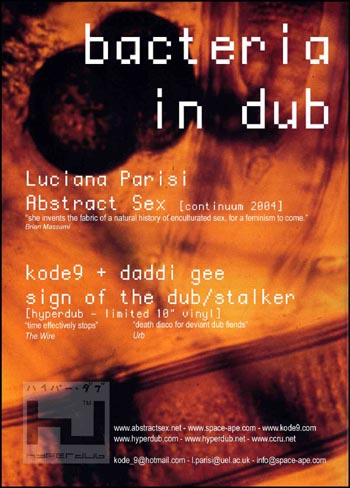
BACTERIA IN DUB will celebrate the co-launch of Luciana Parisi's book
'Abstract Sex: Biodigital Machines and the Mutations of Desire' (Continuum
Press 2004), and the first release on record label Hyperdub, kode9 & daddi
gee's 'Sign of the Dub'/'Stalker'.
BACTERIA IN DUB will feature extracts from the book, versioned by kode9 &
daddi gee, accompanied by video works by Space Ape.
BACTERIA IN DUB will occur between 4 and 7pm, on Saturday the 27th of March
at Plastic People, 147 Curtain Road, Shoreditch, London E1. (nearest tube
Old Street)
Hey you London-based bloggaz, you should all come to this. Matt, Eden, Jim, Oliver - it'd be a great chance to catch up with y'all.
Luke, do you work Saturday?
But as if to knock me down reality came around
Gratifying flurry of activity over at Carlin Towers. I especially like Marcello's disinterring and dusting-off of Gilbert O'Sullivan(the invocation of yet another ghost from my Radio 2-listening childhood); this kind of transvaluation of discarded, disregarded and forgotten MOR is probably what I most treasure about Marcello's writing. And his psychodramatic journey through the new Streets' LP is almost enough to interest me in it.
Almost.
Mike Skinner. Now there's a man in need of a reaping. The Elvis Costello of 'garage' anyone?
March 23, 2004
'BELIEVE ME, IT'S THE FUTURE'
The original Viracy post has slipped off the front page now (and with it my dreams of reaching the 50-comment mark), but I don't want the discussion to peter out yet.
Abe makes some points that need to be addressed, even though I'm not sure what the answers are. In response to my protest that, just because p2p/downloaidng is inevitable is no reason to celebrate it, Abe points out that 'the development needs to dealt with. one option is to rigidify and resist, attempt to turn back time. another is to roll with it, and attempt to construct a system that address the issues in a new manner.'
He goes on: 'I think we all can agree that musicians should be getting paid. But its an issue of how. And I personally think the old intellectual property system is broken on a number of levels. Culturally, technologically, in my mind philosophically... '
And then Abe raises the issue of how downloading is to be policed (if it all): 'I'm curious as to just how you expect to counteract file sharing. Teach the kids not to do it? Enact a DRM regime? Go with an EFF/ASCAP style mandatory licensing scheme? Its hard to get people to pay for things they can get for free you know.."
Some recent comments of new iPod enthusiastNick Gutterbreakz are also highly germane:
"Okay, so I've become an MP3 whore-thief. And de-objectifying my music collection feels pretty fucking good right now. I just reached the point recently where I suddenly realised that I don't want anymore CDs, vinyl etc. Sure, my appetite for new music remains undiminished, but having to own, store and maintain this collection of stuff is getting to be a bit of a drag. I already own more CDs than most other 'regular' people, and I'm damned if I'm gonna put up another fucking shelf when the current one fills up. The idea of non-corporal music storage sounds like just the ticket.
It's been fascinating to observe how iPod has been changing my listening habits. The ability to quickly scan through your collection by artist, album, composer or genre is truly liberating. Far more efficient than peering at endless CD spines, searching for inspiration. And the ability to quickly cue up 'playlists' is a revelation. It's like making yourself a new compilation tape every day. I know there's a lot of people out there, including some close friends, who find the whole concept horrifying. But try it first. Believe me, it's the future."
And a line to chill the heart of Matt Woebot: 'I can envision in maybe ten years time having almost no physical music collection at all, other than a few symbolic or sentimental items.'
I haven't got much to say at the moment, I've already confessed to being a digital conservative; I suspect many of my attitudes will appear reactionary, absurdly archaic, in a few years time. No doubt Abe's right; even if we wanted to prevent downloading, we couldn't. I know Matt and I are in a minority when it comes to questioning p2p and mp3 downloading, but ---- well, this new deobjectified world of music, it still makes me --- uneasy........
March 22, 2004
CINEMA OF THE BRAIN
Now available on The Kubrick Site (invaluable source of resources on SK for those who don't know it), Bill Krohn's Deleuze-inspired analysis of Full Metal Jacket as the cinema of the brain. The relevant extracts from Deleuze's Cinema 2: The Time Image are also included.
SEASON OF THE WITCH
Sinker on Donovan's 'Season of the Witch'. Has anyone seen the gratifyingly weird Romero movie(which features the Donovan tune)?
March 21, 2004
POP LATEST
Yep, I agree with Simon about 'Slowjamz'; it's that heliumed-up vocal in the chorus that does it, innit?
Also rather partial to the new Sugababes. In fact, I pretty much like everything they do. Two caveats about their eminently hummable latest:
1) The video --- it's kinda sleazy. The girls trying way way too hard. Didn't the appeal of the Sugababes used to be that they were kind of ordinary-looking? This transmutation into pole-dancing temptresses doesn't do anything for me.
2) The lyrics --- it's like they are written by an AI attempting to simulate a zeroes' Pop song. All the individual words make sense, but the lines, the song as a whole, it makes no sense at all.
The mp3 neo-con complex
An interesting addendum to the mp3 discussion here by the genius Carmody. By New Right, I wonder if Robin means quasi-Fascist-nationalist or neo-con pro-market? It makes all the difference.
Quite how file-sharing maps onto molar politics is a fascinatingly fraught question, but not at all clear. I've already cited the simplistic arguments of the so-called dot communists. Their message: culture should be free. Free, that is, in a double sense, liberated (as in, 'information wants to be free'), but also gratis, available to all. As I've argued, the apparent nobility of this position conceals some lazy and unsupportable assumptions. I hesitate to call it leftist, actually - how can a position so pro-consumer and so anti-labour/ producers be leftist? - but it certainly conveniently highlights the vices of a certain left mentality (the assumption that charging for things is wicked and indefensible, that people somehow have a right to culture but no obligation to pay for it). It seems to me that Mark S and Abe - in the comments here - represent a much more subtle and sophisticated version of this type of thinking, spliced with, especially in Abe's case, a strain of libertarianism. It's this libertarianism that suggests the dove-tailing of a pro-mp3 position with elements of neo-conservatism.
But where I don't see a connection with neo-conservatism is on the issue of marketization. Take, for instance, Mark's point - from Jefferson - that culture should be considered a 'necessity' and effectively removed from the marketplace. I would expect neocons to take exactly the opposite view: i.e. that everything should be marketized. I don't see how this can be squared with P2P practice AT ALL.
BEST FILMS EVER
Thank God I'd been fortified by The Reaper before watching the conclusion of the repeat of C4's 100 Best Films Ever last night. I missed this the first time round, and you know what a sucker I am for these lists and charts. But by the seething void of uttunul, this was mortifying. Stubbs' savagings of Gladiator and The Shawshank Redemption were thankfully fresh enough in my mind to defend my CNS against a Scanner-style meltdown of rage upon witnessing their top ten - that's right top fucking ten -placings, which is to say, higher than Vertigo, higher than Citizen Kane.... The Reaper's invective also innoculated me against the fact that The Full Monty was placed in the top 100 - yes, people really do consider it one of the 100 best films ever made. Give me strength. But NOTHING, nothing, could protect me from the unveiling of - calm down, Mark, take deep breaths -Star mothafucking shitting bastard Wars as number one. Number one! The best film ever made.
The best film ever made.
Time was when I would idly toss Ballard's description - 'Hobbits in space' - at SW by way of dismissal, but that, errr, doesn't really suggest withering contempt any more. One can only assume that the top ten would be worse now than when C4 did the poll in 2002 - I suppose it's just a question of how many of the goddamn LOTR movies would make it into the top 10.
Eccleston confirmed as New Doctor Who
....And you saw it speculated upon here first .... I like Eccleston; he can have a real edge and intensity. What I worry about is his doing one of his 'posh' accents (a la 28 Days Later and The Others); he is always painfully unconvincing when attempting this. But I suppose the possibility of his doing the Doctor in broad Salford is uh somewhat small...
March 19, 2004
SHOUTS
By way of a supplement to Matt's blogroll of honour, a few blogs that DEMAND plaudits:
My boy Robin - I called Undercurrent the best new blog on the block a while back and I see no reason to revise that estimation. Incisive, compelling, knowledgable, and with an assured lightness of touch, undercurrent has what IMHO many more narrowly-focused music blogs lack - a breadth of cultural reference that makes his music discussions MATTER.
Erase the world Vividly evocative, beautifully honed prose-poetry, ETW's transposition of existential desolation into jewelled words never disappoints. Like Undercurrent, Baal's music coverage gains in power for not being the exclusive subject of the blog.
Oliver. No-one who's sampled any of the boy Craner's proliferating avatars can mistake the quality of insigh, research and writing. It's almost enough to interest me in politics, current affairs and Important Stuff.
New York London Paris Munich. The definitive popblog. Nuff said. (btw for those folk who haven't caught it, you can see Tom taking up the theme of tracking down Marvels in the 70s here).
Crumbling Loaf - the meister or moroseness, the prince of ennui...
More updates please:I Feel Love
Most missed: they still update occasionally, but WAY too infrequently: It's All In Your Mind .
And of course,
Most valued newish presences in the k-punk comments box: the Freaky Trigger/ NYPLM massive, Tom and - for tireless energy and contrarian genius - Mark S. (Maybe one day we'll agree on summat!)
One to watch: the boys at whore cull now have a blog. Been a bit slow cottoning onto this, but check it...
RANTS AND INCENDIARY TRACTS
Naturally I echo Simon and Robin's recommendations for
(Incidentally, I assume that Tarantino's career will be allowed to slink away and die in peace after the embarrasment of 'Kill Bill'. Talk about worst films ever, forget Ed Wood, that turgid, twin-necked, triple-album folly must be one of the most inept and indulgent movies ever to achieve mass distribution.)
Actually, in these days of PR hackery, it's great to read something that departs so totally from obligatory positivity and mealy-mouthed politeness. Stubbs' anti-hagiographies are essential antidotes to what he pointedly calls hype-notism (great neologism, just what I was looking for when I was in pursuit of Poptimism). So many of his rants are inspired by absurd over-estimations. 'Gladiator' best film ever? 'Dark Side of the Moon' best album? 'The Stone Roses' second best? Such ludicrous critical inflations demand the kind of meticulous lambasting at which David excels. His deliriously intoxicating invective is a corrective to what, with painful accuracy, he identifies as 'a collective softening of the braincells and slackening of the wits since about 1990 within popular culture.'
Can I make a request for David to post up his takedown of Marvin Gaye? I'd love to see that.
As for other artists/artifacts I'd like to see get Reaped: Bobs Marley and Dylan, T-Rex, David Lynch (apart from 'Mulholland Drive'), Ken Loach, Mike Leigh, U2...
March 18, 2004
BUILDING WORLDS
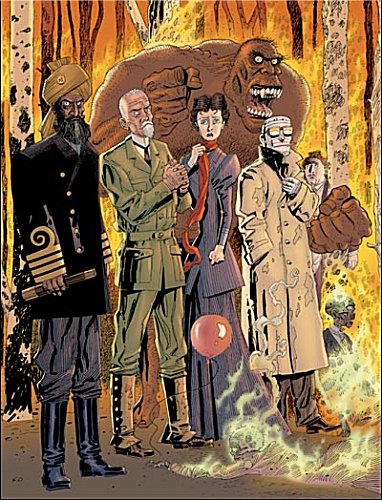
So I watched The League of Gentlemen on video at the weekend. It’s a passable enough romp, if no masterpiece. More intriguing than either the film or the graphic novel upon which it is based (O.K.: I’ll level with you, I’ve only read the second volume of the g-novel) is its premise. I’m sure everyone’s familiar with Alan Moore’s conceit: the wheeze being to combine characters from a number of late-Victorian fictions – Mina Murray from Stoker’s Dracula, Jeckyll and Hyde from Stephenson’s novella, Captain Nem from Verne's 20,000 Leagues Under the Sea, the eponymous hero of Wells’ The Invisible Man, H. Rider Haggard’s Allan Quatermaine, Conan-Doyle’s Moriarty and (in the film alone) Wilde’s Dorian Gray.
Idle googling after watching the film turned up this fascinating article by Peter Sanderson. Sanderson shows that Moore’s aim was an exploration of the origins of the 20C superhero concept in certain archetypes of Victorian fantastic fiction. Moore makes parallels between the iconography and concepts of the superhero comic and those of his simulated nineteenth century world. The name, ‘League of Extraordinary Gentlemen’, for instance, was conceived of as a kind of pre-echo of DC’s Justice League of America and of Marvel’s X-Men. (Hence the marketing of the movie as a ‘Victorian X-Men’.) In addition, Moore’s re-imagining of the Edward Hyde character as an enormously-proportioned brute with superhuman strength – in other words as a kind of 19C Hulk – was an allusion to Stan Lee’s well-known claim that the Hulk = Jeckyll and Hyde + Frankenstein’s Monster.
Moore’s ambition extended beyond a genealogy of the superhero, though, and embraced broader questions about the relationship between fiction and ‘reality’. Moore’s contention is that the construction of mythical systems is as old as the species itself, and, in the second volume of the g-novel, he includes an absurdly compendious ‘Traveler’s Almanac’ which incorporates and interweaves Moore’s own retellings and appropriations of fictional characters into a grand cartographic survey of the world’s mythologies.
Sanderson demonstrates that Moore’s methodology is nothing new, finding parallels for this appropriative implexing (or enfolding) in such august sources as Dante and Virgil (remembering of course that Dante famously implexed Virgil into his own mythscape). A more recent analogue is Philip Jose Farmer, whose Wold Newton’s fictions retold the stories of Doc Savage, Tarzan, Sherlock Holmes, amongst many others. Farmer’s idea was that a meteor hit a small English village in 1795, causing mutations in the gene-line which ultimately result in these heroes. (cf also Marvel’s Conspiracy mini-series, which cheekily suggested that the whole pantheon of Silver Age Marvel heroes were the results of US government experiments with radiation.)
Sanderson identifies that what was unique about 60s Marvel was that it projected a consistent universe. In the years prior to Marvel’s arrival, DC – which trumpets itself as the ‘original universe’ – had in fact failed to cotton on to the possibilities of creating a plane of consistency connecting all their books. Marvel’s titles, on the other hand, were from the start envisaged as an interconnected rhizome, presided over by the omniscient creator-writer-editor Stan Lee (with footnotes - which, as per my last Marvel piece, added to the frustration of the Brit reader: i.e. ‘see Defenders 14’ – which you knew very well that you would never see. But that’s another story.)
We’re approaching the mechanics of Pulp Theology. Pulp is above all about the production of universes . Not parallel universes, but universes which establish a plane of consistency between their fictional world, ‘our’ world and previous fictional worlds/ mythologies. Compare for instance Marvel’s use of Dracula, Frankenstein’s Monster, Norse mythology (Thor). Consistency is a crucial dimension of what fascinates about Pulp. Whereas the artist-author insists on repeated acts of new creation, building worlds anew with each fiction, the pulp author supplements and elaborates upon the same mythscape,. With each additional fiction, the mythwolrd becomes more and more independent, attains an autonomy from its supposed ‘creator.’ It is as if at a certain point the unconscious refuses to accept the unreality of the characters and the world to which they belong. (No negation in the unconscious according to Freud, remember). As these worlds become more autonomous, have more reality invested in them by their readers, they cease to be the exclusive product of their supposed creators. It is for this reason that authors are often uneasy about the production of such world; Stephen King’s The Dark Half and Misery and Peter Straub’s Mr X give an insight into the disquiet – and distaste – mass market authors can have for readers who take their fictions too seriously.
King can be contrasted with Lovecraft who, like Marvel, constructed a consistent universe across his fictions. It is not so much the power of Lovecraft’s lurid descriptions which give rise to the sense of reality his fictional world acquires; it is the sheer fact of his universe’s consistency. Erik Davis points to this in a brilliant piece on Lovecraft, :
'Though Lovecraft broke with classic fantasy, he gave his Mythos density and depth by building a shared world to house his disparate tales. The Mythos stories all share a liminal map that weaves fictional placeslike Arkham, Dunwich, and Miskatonic University into the New England landscape; they also refer to a common body of entities and forbidden books. A relatively common feature in fantasy fiction, these metafictional techniques create the sense that Lovecraft's Mythos lies beyond each individual tales, hovering in a dimension halfway between fantasy and the real.
Lovecraft did not just tell tales—he built a world.'
Davis calls Lovecraft’s approach ‘magick realism’, although – with due deference to Angus’ objections to this genre– I should point out that he distinguishes Lovecraft’s fiction from that of authors like Allende and Marquez. Whereas Marquez and Allende dust conventional realism with a patina of the Fantastic, Lovecraft’s tales had a more literal magical dimension. Davis: ‘Many magicians and occultists have taken up his Mythos as source material for their practice. Drawn from the darker regions of the esoteric counterculture—Thelema and Satanism and Chaos magic—these Lovecraftian mages actively seek to generate the terrifying and atavistic encounters that Lovecraft's protagonists stumble into compulsively, blindly or against their will.’
Naturally, Lovecraft’s world depends for its unliving vitality upon being taken for real by fans. ‘The word "fan",’ Davis identifies, ‘comes from fanaticus, an ancient term for a temple devotee, and Lovecraft fans exhibit the unflagging devotion, fetishism and sectarian debates that have characterized popular religious cults throughout the ages.’
It is this fanaticism that so troubles some authors. Straub’s Mr X, by the way, is about a reader who – Straub implies – idiotically refuses to accept the supposed unreality of Lovecraft’s fictional cosmos. Compare this with John Carpenter’s masterpiece, In the Mouth of Madness. The film is itself a hyper-commentary on Pulp, in which writer Sutter Cane (a thinly-veiled King-Lovecraft composite) acts as the conduit for an invasion and contamination of our world. The invasion is not supernatural, but ontological. In a textual analogue to the Videodrome signal in Cronenberg’s film (one of countless Horror references in ITMMM), Cane’s novels weaken their readers hold on this reality, preparing the way for the return of the Old Ones. Cane ultimately comes to the realization that his fictions were retro-engineered by the Old Ones as a means off ensuring their return. ‘I thought I was making it up, but they were telling me what to write.’ Cane explicitly compares his fictions to religion, but concludes that no-one ever believed religion enough to make it work. The relation between Pulp and religion is, after all, more a matter of cultural policing mechanisms than it is a reflection of their substantive content. PKD demonstrated time and again that the distinction between pulp fiction and Gnostic revelation was an optical illusion, and what could be a better demonstration of the interchangability of cheap SF and religion than the career of L Ron Hubbard and scientology?
This interestingly connects up with the mp3 debate currently raging in the comments below because in many ways the cost of producing a universe is that your characters become public property. (Marvel’s own fierce protection of its own copyrights perhaps belies this somewhat; I never really understood how Wu Tang got away with their outrageous but brilliant appropriation of Marvel memes). Moore’s very ability to incorporate a range of characters from different authors into his League presupposes that these characters have entered the public domain. Such fictions gain reality by being dissociated from a single author, by being collectivized. Again, both Lovecraft and Marvel are models here – Lovecraft famously encouraged other writers like August Derleth and Clark Ashton-Smith to contribute to his cosmos, and this process continued posthumously when the likes of Brian Lumley and Ramsey Campbell starting producing their own additions to the Cthullhu mythos.
Enough, for now.
March 17, 2004
BRITISH COMIC BLUES
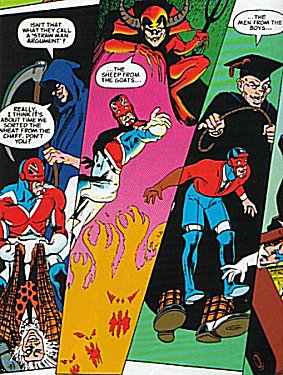
Another great post from Nick Gutterbreakz.
Nick's commments on the difficulty of tracking down Marvel comics in the seventies are especially resonant for me. I echo absolutely what Nick says about the allure of the newsagents and the experience of discovering treasure troves of back issues in out-of-the-way seaside shops.
Britain in the seventies still felt like a wartime rationing culture. It wasn't only the dominance of war comics ('Die, Fritz! Aaaaarghhhhhhh') that reinforced this impression; it was the sense of living in a monochrome outpost of the past. There's a Robin Carmody-type analysis to be done of the Britcomics culture of masculine sporting and fighting prowess, with its association of Englishness with a turn-of-the-century Public School model of heroism. (This was doubled by the celebration of an innocent 1930s-vintage juvenile delinquency in kidcomics like the Beano and the Dandy). In any case, we accepted that living in Britain meant being mired in a historical backwater, that our culture was a threadbare, make-do shadow of America's.
The UK Marvel reprints stood out from the other British comics because of their glossy covers, so I remember being heartbroken when, for some reason best known to themselves, UK Marvel reverted to paper covers. But even within the glossy covers, the Marvel UK comics were black and white. What more telling symbol of the relationship between British culture and American culture at the time could there be than the fact that our comics were black and white whereas America's were, as Marvel proudly announced, 'all-colour'?
In those days, long before comic shops were conceivable, especially in the nowheresville, Leicestershire where I lived, American comics were as rare and sporadic a presence as nylons in wartime. As a consequence, it was impossible to follow any story through. So the experience of reading the American Marvels was fragmentary and tantalizing: you knew when you breathlessly reached that cliffhanger panel ('Next: The Abomination') at the end of the issue that you would never manage to get hold of the next installment. Hence each issue was hoarded like cargo-culted debris, a window into an alien world. As Undercurrent's banner commemorates, the advertisements were an integral element of the experience. The box of civil war soldiers, slimjims, hostess twinkies, life-sized Frankensteins, X-ray Specs, selling Grit: these products (forever denied us by the lack of a zip code), fanfared in the pages between the stories, became associated with Marvel's mythworld.
re: my position on the UK comics contingent, I think some clarification is required. My problem with Moore et al wasn't so much with their Marvel UK work; it's the stuff they produced afterwards that I'm more ambivalent about.

Actually, it's not quite true that Moore and Davis rescued Captain Britain. CB started off as a laughable disaster area for sure; the stories in the woefully disappointing Captain Britain Weekly were interesting only as an insight into American fantasies about Britain: red buses everywhere, blue-helmeted coppas, aristocrats living in stately piles, and a superficial smattering of Arthurian atmospherics. But when Captain Britain returned in Hulk Weekly, allied with the Black Knight and authored by a British creative team, it was much stronger. Captain Britain wasn't an ersatz copy of an American hero any more; the authors interpolated him into a more densely-realised realm of Druidic myths. And when Captain Britain returned again, in the period immediately preceding Moore and Davis' takeover, he was chaged once more. This time, CB's world was derived from the twisted proto-anglopsychedelia of Lewis Carrol and the Avengers: a playing card, looking glass world full of bowler-hatted eccentrics and amiable psychotics. I was particularly fond of the Crazy Gang, for instance.
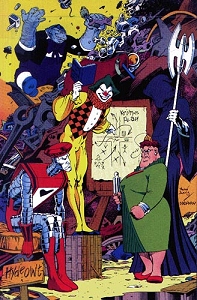
March 16, 2004
ANTI-VIRACY
OK, here's k-punk's contribution to the mp3 debate initiated by Matt.
First off, I'll confess to being something of a digital conservative. I do occasionally download but - partly cos I've got a Mac and can't access the likes of SoulSeek - not very often. I don't have an iPod, nor do I particularly want one. The thought of all my tracks swimming promisculously in some undifferentiated digital gloop.... it just doesn't appeal to me. Nor does the thought of my whole music collection becoming de-objectified. ('Dematerialized' isn't an accurate description: mp3's still have a form of materiality. Or perhaps, as I'll argue below, mp3's involve a dematerialization in the Marxist sense.)
There's no question that downloading mp3's without paying for them is stealing. The issue is: is it an acceptable form of stealing?
The comparison with dubbing albums onto C90's or recording tracks off the radio is bogus, for two reasons. Firstly, there's the the quality of the 'copy'. A digital replica far exceeds the reproductive capabilities of magnetic tape. Strictly speaking, a digital replica is not a copy or a reproduction at all: it is better to think of it as a reinstantiation, since it is exactly the same sequence of zeroes and ones as the 'original'. (Nothing could be a clearer exemplar of Baudrillard's point that, in simulation, there is neither a copy nor an original.) No more reproduction; only replication.
And that leads onto the second point: the virulence of the replica, or rather of the replication process. Cassettes of albums are inert; they can't be copied without incurring further degradation. Digital replicas, meanwhile, especially replicas housed on a computer connected to a peer-to-peer website, have a capacity to exponentially propagate. Viracy.
For both these reasons, mp3's constitute a threshold leap in repliculture.
Now the 'liberationist' arguments seem to me utterly spurious, redolent of the facile claims of so-called'dot communists' . It's the contingent fact that music can be appropriated in digital form that has led to the practice becoming widespread; people are not, by and large, making any political gesture by downloading. The idea that it's legitimate, that, in some sense, it's an obligation to download is predicated on the - surely unsustainable - assumption that record companies are Singular Examples of Evil, unlike any other capitalist corporation. If not, why aren't people advocating stealing from high street stores or burger franchises? In fact, as Matt points out, record companies are involved in a high-risk venture, in which the few successes fund the many 'failures'. It is the mp3 users, not the record companies, who want something for nothing.
The ultimate question from our POV, I suppose, is: will it lead to a more exciting, productive music culture? My answer would be, no. A system of 'trade' which locks producers out of the circuit altogether can hardly be positive. Apologists for this seem to be advocating what is in effect a kind of infantile consumer chauvinism. It is infantile in that it makes an unrealistic demand for unlimited satiation, and in that it seems to imagine that culture is produced without labour (as if it is witheld from free distribution simply from a sense of spite or greed). It is in this sense that mp3's dematerialize music: they 'idealize' it into being a product without a producer, removing all references to labour costs.
Rather than being a development to be celebrated, then, mp3 culture highlights and exacerbates one of the most pressing problem with web culture. It is positive for consumers but negative for cultural producers. The one big gain for producers is that, in facilitating an unprecedented level of cost-free distribution, it allows them to bypass what Mark Sinker calls the 'gatekeepers' of culture - publishers, record company executives. Yet this very ease of distribution is quite obviously also a problem for producers in that it is decoupled from any possible finanical reward.
The means of production are ours, as are the means of distribution - but the means of remuneration remain out of reach.
March 14, 2004
LISTENING
to:
My Bloody Valentine, 'Loveless': driven to rediscover this by Shields interview on Friday, and what a rediscovery. If anything, it is more arresting, entrancing, enveloping than ever. Anti-climactic drone 'rock': each track a plateau, beyond tension-release. Honeyed wooziness. Bleary clarity. Blurred and lucid.
Fantastic Ruff Squad tape from Luka . Another series of plateaus of a wholly different kind.
28 DAYS LATER
I'm the last person in the world to see this, obviously.
Just watched it on video, and was blown away. It's almost as good as an American film! I've long since learned to dismiss any recommendation of British films; too many bitter disappointments. Watching British films is usually like an act of charity. You feel that you're doing the film a favour. But this is refreshingly lacking in the vices of the typical Britflick; it's neither worthy socialist-realism nor some pathetic attempt to court yoof kulcha. The scenes of deserted, depopulated London are worth the price of admission themselves. But this has a genuine sense of drama and excitement and, most surprising of all for a British film, a real visual imagination. Plus they seem to have innovated a new type of horror monster: the rage zombie, frenzied rather than lumbering.
A quality British film? Whatever next.
Adrian Sherwood/ Asian Dub Foundation/ The Bug , Queen Elizabeth Hall, Thursday
Like longtime collaborator Mark Stewart, Adrian Sherwood is a reverberation from the original postpunk soundclash: the mutant offspring of Cold War apocalypticism, Burroughs/Gysin cut up, JA dub, punk rage and Tommy Boy hip hop. Sherwood long since entered a parallel universe with its own rules and protocols. If you no longer look to him for cutting edging relevance, you can always rely on his old tricks to enchant and entrance . His set, fronted by MC-cum-vocalist Ghetto Priest, is full of his trademarks: hypnotic, loping percussion, sinuous bass, vocal samples, intermittent washes of reverb. Sherwood has always had the dub sorcerer's capacity to breathe unlife into recorded sound, to induce it to crawl out of the speakers.
ADF don't quite possess the same capacity; at least, not on this showing. They are functional but somehow perfunctory, uncompelling. The dub basslines, the drum and bass beats, the violin (yes!) and the MCs never add up to more than the sum of their parts. The Bug, on the other hand, start promisingly. A punitive blitzscape of pummelling beats is channeled by an MC into a frenzy which has the audience up on their feet. Yet the effect quickly palls. The sound becomes an acrid smog, a dull thudding headache, in which it is well-nigh impossible to distinguish the individual elements. The MCing, like so much live rap, merely adds to the porridge, and you start to hunger for some subtelty, some differentiation. The ultimate effect is disengagement; your nervous system, sick of the struggle, cuts out. A bad night? Bad sound? Who knows.
Many thanks to the delightful Magz of Resonance FM for scoring me a free ticket.
March 13, 2004
RETURN OF DREAMPOP

There's was something reassuring about the interview with Kevin Shields in The Guardian on Friday. Shields is the kind of 'pop star' that it seems died out with an earlier era: visionary, tempermental, driven, detached from what we are pleased to call 'reality', or rather occupying his own reality and acting as a conduit, a vessel, through which that alternate reality can invade our own. 'I live so much in my imagination,' Shields told Paul Lester. 'My version of reality is so different ... I don't necessarily connect with things.' Compare Jamelia (whose new single, incidentally, is very good), in the Sunday Times last week: “I do see myself and my career as a product,” she says. “So the image that I give to the public is what I want them to think of me. It’s sort of being like an advertiser: I’ve got a product that I need to market.” Jamelia's instrumentalism is not itself cynical so much as an adjustment to the kynical reality of kapital. Now Pop is, above all, well-adjusted; it doesn't seek to transfigure the world, offers us no transports of ecstasy or escape. It's not for nothing that hip hop, with its banal ambitions and dreary aspirations, its ostensible ultrarealism, is king in Now Pop. Shields' version of Pop - aptly termed Dreampop, once, of course - dissents from this reality, not in the name of unreality or fantasy, but in the name of libido. Desire can never be persuaded to take the drab world of Work and Wealth at face value. For libido, that world is an unconvincing theatre populated by poorly animated puppets and grim effigies: an existential charade that everyone necessarily occupies only - as Jamelia's comments make clear - as impostors, as play actors. Dreampop has always robbed the World of Necessity of its claim to ontological precedence over the realm of Desire. Jamelia's observations show that Now Pop has reversed this prioritization; Pop is now a colony of the world of Work.
The contestation Dreampop effects has its costs, naturally. To refuse to take the world of Health and Efficiency seriously is to flirt with illness, anhedonia, agoraphobia, (living) death. The symptoms of Shields' 'condition' - getting up in the afternoon, if at all, vegetating in front of the box, doing as little as possible - are all too familiar. "I just didn't do what I didn't want to do. And I got away with it. When you keep on getting away with it year after year, you think you can just live like that. And you can. I wouldn't work. I wouldn't get up till late afternoon. I watched a lot of shit films."
I'm sure I'm not the only one who is glad that Shields is back with us, dreaming for us...
March 10, 2004
GENEIUS
Here's one of my other favourites: 'genial' Gene Colan. Colan - whose art has a delirial, woozy, psychedelic quality - was the definitive artist for Dr Strange and Dracula.
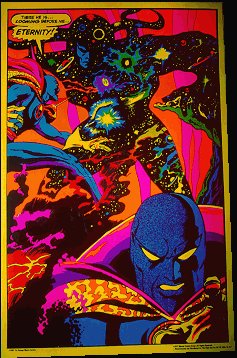
March 09, 2004
KING KIRBY
More Kirby, cos I love it.

Giganticism...
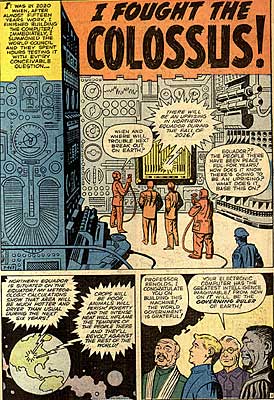
Enormous machinery....
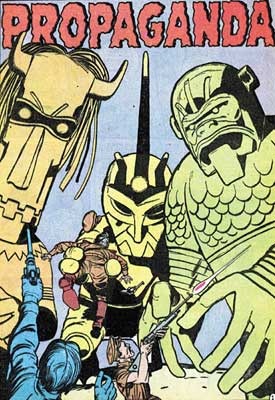
Verging on the abstract...
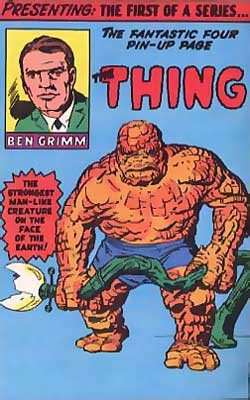
Easy to forget the rough and ready way in which Kirby rendered characters whose image has been smoothed out and standardized over the years. Kirby was a PULP artist in every respect. Check the way his Thing looks as if it is only partly formed, as if it is composed of some amorphous pulpy matter.
KIRBY, ANOTHER GREAT K
Another wonderful post from Nick Gutterbreakz. All kinds of interesting stuff to take up there, but for now, and since Nick mentions Mighty Marvel - this site is my latest FAVOURITE THING EVER. Monsterblog is devoted to the pre-Superhero monster work of the incomparable Jack Kirby. For those who don't know, Kirby was the unsurpassable genius responsible for the first Incredible Hulk and Fantastic Four strips - in other words, one of the greatest visual artists of the twentieth century.
Check the way Kirby almost dispensed with perspective, flattening out everything onto a Bosch-like single plane. Kirby's art was literally awesome: his habitual mode was the cyclopean, the sublimely vast. He conjured enormous machinery, cities of dizzying scale, and most of all, gigantic, lumbering beings, all rendered with an expressionistic crudity.
Monsterblog is a lovingly compiled compendium of Kirby's early strips, some of them never previously reprinted. The 'meet the monsters' page is a stunningly well-researched index of all the monsters, boasting a taxonomy worthy of Borges. 'Alien Conqueror ... Atomic Freak.... Lab Experiment Gone Wild... Subterranean Creature....'
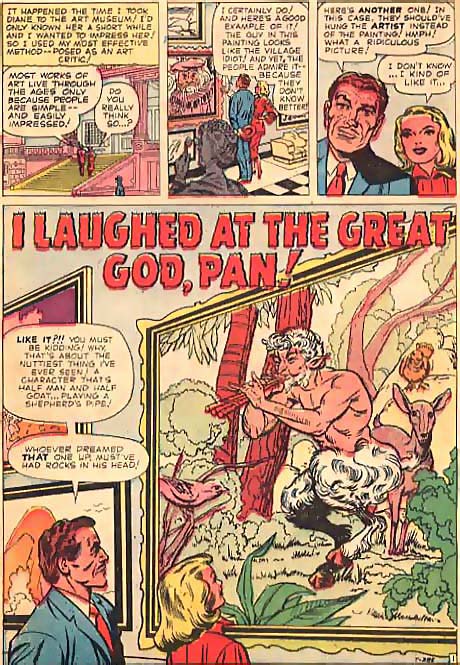
Could THIS be the origin of the line 'I laughed at the Great God Pan' from The Fall's 'Leave the Capital' off Slates?
March 08, 2004
March 07, 2004
IS THERE A FUTURE?
Nick Gutterbreakz definitely NOT talking bollocks: 'Remember when acts like LFO and Orbital were taking instrumental techno into the pop charts in the early '90s? Surely that was the template on which modern pop should have been based. And when Garage invaded the charts a few years ago, it seemed to be speaking a new language. So what happened?Our technology has evolved, but the methods of conveying ideas and emotions have remained static. Don't get me wrong, I enjoy Girls Aloud as much as the next man, but there's always that sense of unease....shouldn't pop have evolved beyond all that by now?'
'If anything above resonates with you, please let me know...' Well, it certainly resonates with me. Not wishing to revive the whole Poptimism/ Popsceptic debate, but many of my reservations about current Pop revolve around its retreat from any modernist impulse, its apparent contentedness to rejig the same few elements ad infinitum. Incidentally, I don't have a problem with electronica being used to perform 'traditional song-based material'; what I want is a new way of performing it. The Junior Boys, of course, remain the exemplars of what can be done to make new combinations of Song and electronica.
What Nick says echoes Simon's remarks on the exhaustion of Dance. Sometimes I wonder if Pop as such - 'beat music' in the widest sense - hasn't reached some kind of terminus. Is it possible for it to produce what-the-fuck affects any more, or must we now be satisfied with low-intensity rehashes forever? The speed of musical development between 1963 and 1982 was incredible and unprecedented. For those of us who grew up in that period, its mutational acceleration produced a hunger for the novel, and a sense of dissatisfaction with retroism of any stripe. As I've often said, in 1979, 1966 was much further away than it is now. Pop - Eppy's Pop 1, chartpop - abandoned modernism sometime in the eighties. What modernist drive it had came from the incursions and influence of Dance. But if Dance has been Pop's Modernity for the last two decades, what are we to make of a situation in which Dance has itself gone postmodern? (cf what Simon says about 'all the period sounds being juggled and obscure archival sources coming in and out of favour, [so that] it's at the point of there being a 'record collection dance' just like there's been 'record collection rock' since the Jesus & Mary Chain. Retro-Dance to match Matt's Retro-Rock TM.) Where will the impulse for renewal come from, or are we stuck on a Postmodern (not so)merry-go-round?
btw I'm intrigued by what Nick writes about Four Tet and folktronica (it reminded me of Robin's speculations about a new sampladelia in this by now legendary post; by pure coincidence, I heard the Four Tet album today. I like it, but it doesn't really live up to Nick's intriguing description. Or at least, it doesn't compete with the album that his description inspired me to imagine. It's partly the problem of beats. There's something tired about sample-based music which still holds everything together with a metric beat, especially a generic 'hip hop' beat. Robin's comments on beatlessness make me wonder if losing the beat isn't the most radical step that could be taken; needless to say, I would have found such a possibility unthinkable and heretical in the beatplexed ecstasy of 94. But now, now, the possibilities of escaping 50 years of 'beat music' are fascinating...
I NEED A HIT
I'm pleased Britney's number 1. Just noticed that the first verse includes the line. 'I need a hit.' A little bit too close to the bone, that, I should have thought....
BACTERIA IN DUB
BACTERIA IN DUB will celebrate the co-launch of Luciana Parisi's book
'Abstract Sex: Biodigital Machines and the Mutations of Desire' (Continuum
Press 2004), and the first release on record label Hyperdub, kode9 & daddi
gee's 'Sign of the Dub'/'Stalker'.
BACTERIA IN DUB will feature extracts from the book, versioned by kode9 &
daddi gee, accompanied by video works by Space Ape.
BACTERIA IN DUB will occur between 4 and 7pm, on Saturday the 27th of March
at Plastic People, 147 Curtain Road, Shoreditch, London E1. (nearest tube
Old Street)
feel free to transmit this information to any interested parties
for information please contact l.parisi@uel.ac.uk or kode_9@hotmail.com or
stephengordon70@hotmail.com
March 06, 2004
GUTTERSYNTH
Nick Gutterbreakz with some great new stuff, including a rundown of neglected synthpop classics.
March 05, 2004
LOOKING GOOD FOR NEW DR WHO
Encouraging signs.
League of Gentlemen's Mark Gatiss (who's writing for the new Dr Who series) on the good Doctor. 'Russell T Davies said to me the other day that he worked it out in his head that he's always regarded it as a science fiction, but what Doctor Who always did best was horror and I think that's absolutely true. From arctic bases besieged by monsters to Cybermen on the moon, it's the creeping unknown, it's the shadows and the hand at the end of the episode; it's all horror.'
March 04, 2004
SFJ/ ARTHUR RUSSELL
I echo the applause for SFJ's New Yorker piece on Arthur Russell. Do yourself a favour and read this, if you haven't already.
March 02, 2004
WORST RECORDS EVER?
Marcello's forensic dissection of Kenny Everett's World's Worst Record Album Ever and his own list of the twenty worst singles ever. Pleased to see that the loathsome Stone Roses make Marcello's worst ever list. And 'Imagine.' And Deacon Blue. And Robbie, of course, though I'd probably vote for 'Angels' above 'Let Me Entertain You.' Can't concur on Duran Duran, though I have to confess that 'Is There Something I Should Know?' wasn't one of their best moments. And you think 'Mysterious Girl' is bad? Not half as excruciating as 'Flava', I can assure you. I can only echo Mr Carmody: 'Peter fucking Andre, though. And Chris fucking Moyles. Fuck every one of you (including the grinning, complacent apologists on ILM).'
Fascinating little parlour game, of course, but not one I can participate in too confidently; my memory for poor records is too short-term. Perhaps thankfully, I manage to freeze them out of mind until I hear them again. That bloody DJ Caspar single has got a good shout at the moment, however.
And surely 'Sledgehammer' would have to be in there somewhere....
And something by U2, naturally, although how does one choose from such an embarrassment of riches? It would have to be with the video for maximum impact, since the sight of Bono's smug histrionics reduces all sensitive sentient creatures to a state of rabid insensate rage.... What was worse, the wholesome muscular christian earnest Bono or the 'ironic' PoMo version? Who cares.
'Dancing in the Moonlight.' No explanation or justification required, surely.
'There She Goes', The Las, whose ghastly, cheery, cheeky, scally bonhomie never fails to put me in a pyschotic fury and black cosmic despair.
George Michael/ Wham! More or less anything. Wham! were culture criminals ushering in the termination of glam and the rise of the boy band. A tough call as to whether the Wham atrocities or the ponderously unlistenable, self-regarding solo singles were worse really.
Shooting fish in a barrel, but --- pass me the rifle --- Kylie Minogue, 'Some Kind of Bliss', a record that actually makes me feel embarrassed to even contemplate --- the desperate, flailing begging for credibility --- it's painful to remember, isn't it?
Big Sound Authority, since Marcello mentioned them a while ago. Younger readers should note that BSA were perhaps the worst and most heinous example of Eighties' earnest, big-hearted Soulfulness. There is no lower or more despicable form of culture.
Speaking of which: the Style Council. Anything and everything.
Mariah Carey. Can't remember the name of it, that awful single, you know, the one with the the video where she wore hot pants and was on a motor-racing track. So tuneless and uncatchy and arythmic it was almost avant-garde. Stupefyingly bad.
Big Audio Dynamite. Can't remember the name of their singles either. But they were all dreadful: that stodgy, clunky anschluss between rock and 'funk'. Puhleeze.
And since we're in this neck of woods - The Clash, 'Should I Stay or Should I Go.' Horrible.
The Streets.
Nah, not really, just joking about that last one.
I'd opt for The Darkness, but they're just too mediocre really, aren't they? (That new single is awfully reminiscent of Big Country in parts, donchathink?)
And if we're going for most mediocre record ever, Beyonce's 'Me, Myself and I' must have a strong shout.
REVELATION
Robin Carmody (only) twenty-three shock! I thought he was, like, forty or something. In the best possible way, y'hear. On grounds of authoritativeness and knowledge, like.
The Oscars
No wonder Hollywood films are so shit, with scripts this bad. What is more inept - the lame lines they give the actors to read at the ceremony or the appallingly stiff way in which they perform them? This sappy, sentimental, self-congratulatory awards show sums up much that's loathsome about America.
Does anyone else want to kick Renee Zelwegger downstairs?
March 01, 2004
WORLD'S END
The boy Carmody with lotsa new stuff --- including oblique contributions to the caff wars and tantalising references to what sounds like a fascinating row at ILM. A little frustrated by not being able to identify the thread --- can anybody help?

